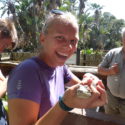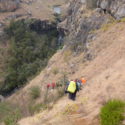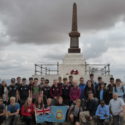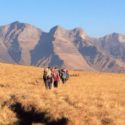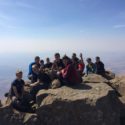28 Cadets and 3 Cadet Force Adult Volunteers of West Mercian Wing Air Training Corps have just returned from a three week trip to South Africa. The main purpose of the trip was to give a new experience and a clear insight into the lifestyles and history of a very different and diverse culture.
The venture in total included four days and nights on a foot trek through the Drakensberg mountains with one group being the first UK cadets to summit Giant’s Castle, the highest free standing mountain south of Kilimanjaro. Three days camping and trekking in the iThala Game Reserve; a tour of the Anglo / Zulu War Battlefields of Isandlwana Hill and Rorke’s Drift then trekking the Fugitives trail from Isandlwana. Five days camping in the St Lucia Wetlands Park and spending three days doing repair work at a Zulu school. The trip was rounded off by everyone having the chance to experience a boat ride around St Lucia Lake looking for Hippos and Crocs.
The Ulysses Trust Grant of £2,250 was much needed and appreciated and it helped to pay off the increase in payment for the flights. This saved us a considerable amount of fund raising and being able to close out these payments in July.
The expedition was planned to be the trip of a lifetime for the cadets, for those who had not been outside of the UK before, it was a life changing experience both from the wildlife perspective and the opportunity to witness Zulu culture.
The mountain expedition was an awesome experience, living for 4 days and nights with only essential equipment, no modern electronics apart from cameras, was an experience, almost a sense of freedom, working just by the sunrise and sunset. The team was split into two groups with one group sleeping in caves each night which added to the experience of the venture. The second group wild camping on the high Berg as they made their way to summit Giant’s Castle.
Carrying heavy rucksacks in the heat was really hard and the expedition experienced really good weather (perhaps too good) and for some it was their first experience of a mountain expedition at altitude. Everyone found this expedition a really challenging time and made us respect our Guides even more for their knowledge and dedication to making our mountain expedition safe and enjoyable.
While camping and trekking in the iThala Game Reserve the group soon realised that animals have a lot more character in their natural habitat and seeing a wide range of animals grazing in the same area. This phase of the venture provided a chance to be completely at one with nature and learn to appreciate life with only the bare essentials, no modern technology and with people who had become good friends. The party practiced ‘minimal impact and leave no trace’ and were constantly learning about the environmental issues affecting this Game Reserve.
The team went on an Anglo/Zulu war battlefield tour, visiting the main two battlefields of Isandlwana Hill and Rorke’s Drift, as well as trekking the Fugitives Trail from Isandlwana, the route the survivors took in their attempt to reach Rorke’s Drift.
Working at the Zulu school gave an insight into the lives of those from a different culture and in the afternoons the children would appear and football games would start. Seeing how the Zulu are able to live happily without modern commercialisation made everyone appreciate the simple things in life.
In the end it all comes down to team work and self confidence. By the end of the venture everybody had gained more respect for the simplicity of nature and also the animals after seeing them roaming free and wild in an untouched unspoilt environment. It was inspiring to see how individuals supported each other throughout the expedition. In conclusion we consider this expedition a great success with many of the group wanting to travel again further broadening their horizons and opening their minds to new opportunities.
Squadron Leader Bill Hoe who organised the expedition commented ‘We are very grateful to the Ulysses Trust for their generous grant which helped the cadets achieve a huge amount from this expedition, the majority of whom had not been trekking overseas before’.

